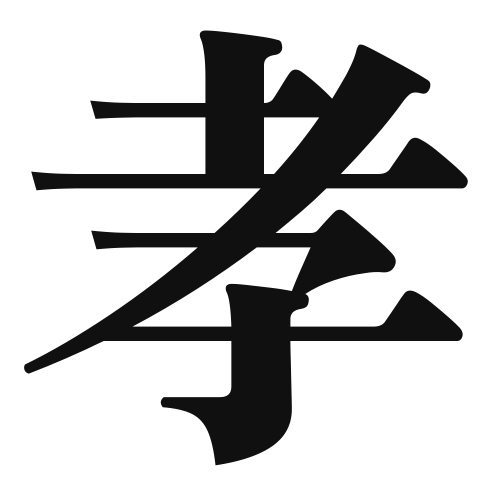1. Overview of Meaning
The kanji “孝” (kō) represents the concept of filial piety, which is a virtue of respect and duty towards one’s parents and ancestors. It embodies the idea of honoring and caring for one’s family, particularly the elderly and those who have passed away.
2. Formation and Radicals
The kanji “孝” is composed of two parts: the radical “子” (child) and the character “こう” (which represents the concept of being good or virtuous). This combination signifies the relationship between a child and their parents, emphasizing the importance of respect and care.
The radical “子” indicates that the character is related to children or offspring, reinforcing the theme of familial relationships.
3. Examples of Usage
Common words and phrases that include “孝” are:
- 孝行 (こうこう, kōkō) – Filial piety or good deeds towards parents
- 孝子 (こうし, kōshi) – A dutiful child
Example sentences in daily conversation:
- 「彼はとても孝行な息子です。」(Kare wa totemo kōkō na musuko desu.) – “He is a very dutiful son.”
- 「孝行は日本の伝統的な価値観です。」(Kōkō wa Nihon no dentō-teki na kachikan desu.) – “Filial piety is a traditional value in Japan.”
4. Synonyms and Antonyms
Similar kanji with related meanings include:
- 敬 (けい, kei) – Respect; while “孝” focuses on familial respect, “敬” can refer to respect in a broader context.
Antonyms include:
- 不孝 (ふこう, fukō) – Disrespectful or unfilial; this term describes a lack of respect or care for one’s parents.
5. Cultural and Historical Background
The concept of “孝” is deeply rooted in Japanese culture, influenced by Confucianism, which emphasizes the importance of family and respect for elders. It is often seen as a fundamental virtue in Japanese society.
Proverbs and idiomatic expressions related to “孝” include:
- 「親孝行は一生の宝」(Oyakōkō wa isshō no takara) – “Filial piety is a treasure for a lifetime.”
This highlights the enduring value placed on honoring one’s parents and the legacy of respect within families.
